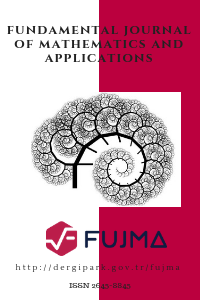On the Exponential Diophantine Equation $(6m^{2}+1)^{x}+(3m^{2}-1)^{y}=(3m)^{z}$
On the Exponential Diophantine Equation $(6m^{2}+1)^{x}+(3m^{2}-1)^{y}=(3m)^{z}$
Let $m$ be a positive integer. In this paper, we consider the exponential Diophantine equation $(6m^{2}+1)^{x}+(3m^{2}-1)^{y}=(3m)^{z}$ and we show that it has only unique positive integer solution $(x,y,z)=(1,1,2)$ for all $ m>1. $ The proof depends on some results on Diophantine equations and the famous primitive divisor theorem.
Keywords:
Classification method, Exponential Diophantine equations Primitive divisor theorem, Terai’s conjecture,
___
- [1] L. Jesmanowicz, Some remarks on Pythagorean numbers, Wiadom Mat 1, (1955/1956), 196-202.
- [2] N. Terai, The Diophantine equation $a^x+b^y=c^z$, Proc. Japan Acad. Ser. A Math. Sci., 70 (1994), 22-26.
- [3] M. Le, R. Scott, R. Styer, A survey on the ternary purely exponential Diophantine equation $a^x + b^y = c^z$, Surv. Math. Appl., 214 (2019), 109-140.
- [4] M. Alan, On the exponential Diophantine equation $ (m^2+m+1)^x+m^y=(m+1)^z$, Mediterr. J. Math., 17 (189) (2020), 1-8.
- [5] M. Alan, On the exponential Diophantine equation $ m^x+(m+1)^y=(1+m+m^2)^z$, An. St. Univ. Ovidius Constanta, Ser. Mat., 29 (3) (2021), 23-32.
- [6] Z. Cao, A note on the Diophantine equation $a^x+ b^y = c^z$, Acta Arith., 91 (1999), 85-93.
- [7] E. Kızıldere, M. Le, G. Soydan, A note on the ternary purely exponential Diophantine equation $A^x + B^y = C^z$ with $A + B = C^2$, Stud. Sci. Math. Hung., 57 (2) (2020), 200-206.
- [8] T. Miyazaki, Exceptional cases of Terai's conjecture on Diophantine equations, Arch. Math., 95 (2010), 519-527.
- [9] T. Miyazaki, N. Terai, A study on the exponential Diophantine equation $ a^x+(a+b)^y=b^z $, Publ. Math. Debrecen, 95 (2019), 19-37.
- [10] N. Terai, T. Hibino, On the Exponential Diophantine Equation $a^x + lb^y = c^z$, Int. J. Algebra, 10 (2016), 393-403.
- [11] P. Z. Yuan, Q. Han, Jesmanowicz conjecture and related equations, Acta Arith., 184 (2018), 37-49.
- [12] N. Terai, On the exponential Diophantine equation $(4m^2+1)^x+(5m^2-1)^y = (3m)^z$, Int. J. Algebra, 6 (2012), 1135-1146.
- [13] C. Bertok, The complete solution of the Diophantine equation $(4m^2+1)^x+(5m^2-1)^y = (3m)^z$, Period Math. Hung., 72 (2016), 37-42.
- [14] J. Su, X. Li, The Exponential Diophantine Equation $(4m^2+1)^x+(5m^2-1)^y = (3m)^z$, Abstr. Appl. Anal., (2014), Article ID 670175.
- [15] J. Wang, T. Wang,W. Zhang, A note on the exponential Diophantine equation $(4m^2+1)^x+(5m^2-1)^y =(3m)^z$, Colloq. Math., 139 (2015), 121-126.
- [16] N. Terai, On the exponential Diophantine equation $(4m^2+1)^x+(21m^2-1)^y = (5m)^z$, Ann. Math. et Inform., 52 (2020), 243-253.
- [17] M. Alan, On the exponential Diophantine equation $(18m^{2 +1)^{x +(7m^{2 -1)^{y =(5m)^z$, Turk J. Math., 42 (2018), 1990-1999.
- [18] N. Deng, D. Wu, P. Yuan, The exponential Diophantine equation $(3am^{2 -1)^{x +(a(a-3)m^{2 +1)^{y =(am)^z$, Turk J. Math., 43 (2019), 2561-2567.
- [19] R. Fu, H. Yang, On the exponential diophantine equation $\left( am^{2 +1\right) ^{x +\left( bm^{2 -1\right) ^{y =(cm)^{z $ with $c \mid m$ , Period Math. Hung., 75 (2017), 143-149.
- [20] E. Kızıldere, T. Miyazaki, G. Soydan, On the Diophantine equation $((c+1)m^{2 +1)^{x +(cm^{2 -1)^{y =(am)^z$, Turk J. Math., 42 (2018), 2690-2698.
- [21] X. Pan, A note on the exponential Diophantine equation $\left( am^{2 +1\right) ^{x +\left( bm^{2 -1\right) ^{y =(cm)^{z $ , Colloq. Math., 149 (2017), 265-273.
- [22] N. Terai, T. Hibino, On the exponential Diophantine equation $(12m^2 +1)^x +(13m^2 -1)^y = (5m)^z$, Int. J. Algebra, 9 (2015), 261-272.
- [23] N. Terai, T. Hibino, On the exponential Diophantine equation $(3pm^2-1)^x+(p(p-3)m^2+1)^y=(pm)^z$, Period Math. Hung., 74 (2017), 227-234.
- [24] K. Terai, S. Yoshiki, On the exponential Diophantine equation, SUT J. Math., 56 (2) (2020), 147-158.
- [25] T. Nagell, Sur une classe d'{\'e quations exponentielles, Ark Mat., 3 (4) (1958), 569-582.
- [26] Y. Bugeaud, T. N. Shorey, On the number of solutions of the generalized Ramanujan–Nagell equation, J. Reine Angew. Math., 539 (2001), 55-74.
- [27] M. Le, Some exponential Diophantine equations I: the equation $D_1x^2 - D_2y^2 = \lambda k^z$, J. Number. Theory, 55 (2) (1995), 209-221.
- [28] Y. Bilu, G. Hanrot, P. M. Voutier, Existence of primitive divisors of Lucas and Lehmer numbers (with Appendix by Mignotte), J. Reine Angew. Math., 539 (2001), 75-122.
- [29] P. M. Voutier, Primitive divisors of Lucas and Lehmer sequences, Math. Comp., 64 (1995), 869-888.
- [30] L. K. Hua, Introduction to Number Theory, Springer, Berlin, Germany, 1982.
- [31] J. H. E. Cohn, Square Fibonacci numbers, Fibonacci Quart., 2 (1964), 109-113.
- ISSN: 2645-8845
- Yayın Aralığı: Yılda 4 Sayı
- Başlangıç: 2018
- Yayıncı: Fuat USTA
Sayıdaki Diğer Makaleler
Generalized Bertrand and Mannheim Curves in 3D Lie Groups
Osman Zeki OKUYUCU, Bahar DOĞAN YAZICI
Determination of Heterogeneity for Manganese Dendrites Using Lacunarity Analysis
On the Exponential Diophantine Equation $(6m^{2}+1)^{x}+(3m^{2}-1)^{y}=(3m)^{z}$
Murat ALAN, Ruhsar Gizem BİRATLI
Fixed Point Theorems in $\mathscr{G}$ - Fuzzy Convex Metric Spaces
On the Bi-Periodic Mersenne Sequence
Gül ÖZKAN KIZILIRMAK, Dursun TAŞÇI
Pedal Sets of Unitals in Projective Planes of Order 16
On Predictors and Estimators under a Constrained Partitioned Linear Model and its Reduced Models
